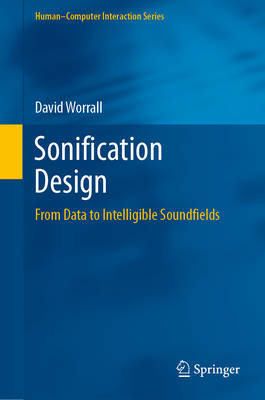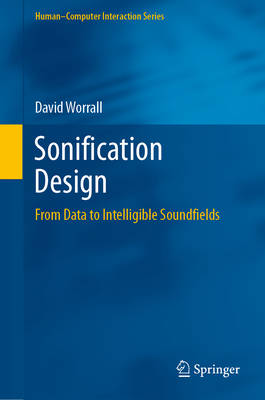
- Retrait gratuit dans votre magasin Club
- 7.000.000 titres dans notre catalogue
- Payer en toute sécurité
- Toujours un magasin près de chez vous
- Retrait gratuit dans votre magasin Club
- 7.000.0000 titres dans notre catalogue
- Payer en toute sécurité
- Toujours un magasin près de chez vous
Description
The contemporary design practice known as data sonification allows us to experience information in data by listening. In doing so, we understand the source of the data in ways that support, and in some cases surpass, our ability to do so visually.
In order to assist us in negotiating our environments, our senses have evolved differently. Our hearing affords us unparalleled temporal and locational precision. Biological survival has determined that the ears lead the eyes. For all moving creatures, in situations where sight is obscured, spatial auditory clarity plays a vital survival role in determining both from where the predator is approaching or to where the prey has escaped. So, when designing methods that enable listeners to extract information from data, both with and without visual support, different approaches are necessary.
A scholarly yet approachable work by one of the recognized leaders in the field of auditory design, this book will
- Lead you through some salient historical examples of how non-speech sounds have been used to inform and control people since ancient times.
- Comprehensively summarize the contemporary practice of Data Sonification.
- Provide a detailed overview of what information is and how our auditory perceptions can be used to enhance our knowledge of the source of data.
- Show the importance of the dynamic relationships between hearing, cognitive load, comprehension, embodied knowledge and perceptual truth.
- Discuss the role of aesthetics in the dynamic interplay between listenability and clarity.
- Provide a mature software framework that supports the practice of data sonification design, together with a detailed discussion of some of the design principles used in various examples.
David Worrall is an internationally recognized composer, sound artist and interdisciplinary researcher in the field of auditory design. He is Professor of Audio Arts and Acoustics at Columbia College Chicago and a former elected president of the International Community for Auditory Display (ICAD), the leading organization in the field since its inception over 25 years ago.
Code and audio examples for this book are available at
https: //github.com/david-worrall/springer/
Here is an excellent review of the book by Dr Gregory Kramer:
"Worrall proceeds bravely through the trees and vines of philosophy, information theory, aesthetics, and other contributors to sonification design theory. It's a feat. He nails all of this down with the specificimplementation system he's designed over many years, and applies his theories to specific problems. In a field of research still in its first half century and setting its bearings in a world where human perception has become a sideshow to machine learning, deep learning, and artificial intelligence, the roots David provides will serve well."
Dr Gregory Kramer is the founding figure in the emerging field of sonification, founded the International Conference on Auditory Display (ICAD) and editor of the first book in the field, "Auditory Display: Sonification, Audification and Auditory Interfaces" (Addison Wesley, 1994).
Spécifications
Parties prenantes
- Auteur(s) :
- Editeur:
Contenu
- Nombre de pages :
- 286
- Langue:
- Anglais
- Collection :
Caractéristiques
- EAN:
- 9783030014964
- Date de parution :
- 12-08-19
- Format:
- Livre relié
- Format numérique:
- Genaaid
- Dimensions :
- 187 mm x 241 mm
- Poids :
- 544 g

Les avis
Nous publions uniquement les avis qui respectent les conditions requises. Consultez nos conditions pour les avis.






